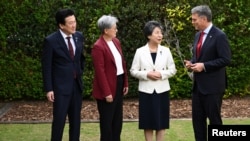Australia, Japan, and the United States are expanding defense cooperation. Analysts say the moves are a response to China's growing military assertiveness in the Indo-Pacific region.
Senior Australian and Japanese officials Thursday met for the 11th Australia-Japan 2+2 Foreign and Defense Ministerial Consultation in the state of Victoria.
Australia’s deputy prime minister and minister for defense, Richard Marles, told reporters that plans were agreed for Japan to join U.S. Marine rotations in northern Australia, as well as more joint exercises and fighter jet deployments.
“The relationship between our two countries really has gone to a very different level. Today we have agreed to enhance our air engagement with greater people-to-people links, more training, greater exercises between our two air forces,” he said.
Long-standing territorial disputes and differences over Taiwan have unsettled Japan’s relations with China.
China overtook Japan as the world’s second-largest economy in 2010 and analysts have said that greater economic prosperity in China has been accompanied by more aggressive military posturing.
The bilateral talks in Victoria came after two Chinese incursions into Japanese territory.
A Chinese surveillance plane breached Japanese airspace on August 26, while a survey ship entered Japan's territorial waters a few days later.
Japanese Foreign Minister Kamikawa Yoko told reporters that closer ties with Australia are essential.
“Amidst the increasingly difficult security environment in the Indo-Pacific, we need to raise the Japan-Australia security cooperation to a new height,” said Yoko.
Under the plans, Japanese troops could join up to 2,500 U.S. Marines who train in Australia’s Northern Territory each year. Japan and Australia could also collaborate on their long-range missile systems. There has been no response, so far, from Beijing to these strategic plans.
Japan was an enemy of Australia and the United States in World War II, but Euan Graham a senior analyst at the Australian Strategic Policy Institute, a research organization funded by the Australian and other governments, said on social media the proposals show “at a symbolic level how successfully Australia and Japan have put wartime memories behind them.”
Australia’s formal military ties with Washington date to the early 1950s and are considered by successive governments in Canberra to the cornerstone of Australia’s sense of security in an increasingly fractious region.





